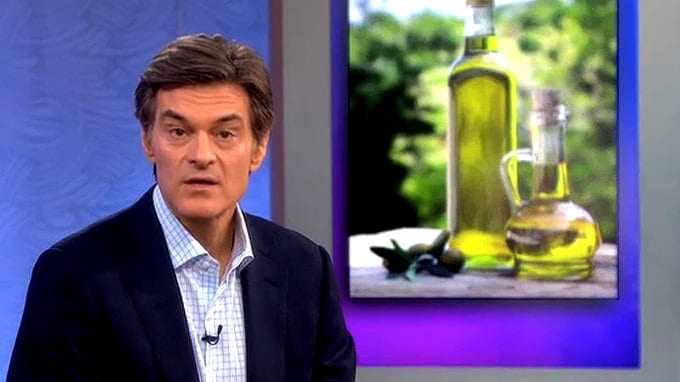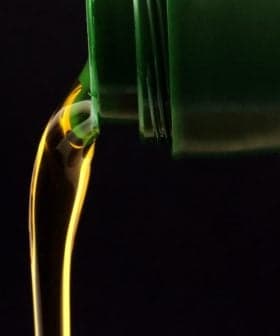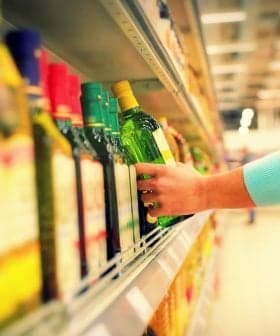 83.3K reads
83.3K readsWorld
Olive Oil Fridge Test? Don't Count On It.

Dr. Oz warned viewers on his show that nearly 70% of extra virgin olive oil on the market may be fake, suggesting a test involving refrigeration to check for authenticity. However, experts argue that the “Fridge Test” is not a reliable method for determining if olive oil is real, and recommend checking harvest dates and quality seals on bottles instead.
On a recent segment of his wildly successful daytime television program, Dr. Oz warned his viewers they are being duped into buying fake extra virgin olive oil. He said some experts claim that nearly 70 percent ofextra virgin olive oil sold is counterfeit, and he urged everyone to check their olive oil with a test that he and his family use.
In the test, Dr. Oz puts a bottle ofextra virgin olive oil in the refrigerator. If it freezes at a normal refrigerator temperature, “then you’re pretty sure it’s pure,” said Oz.
Some experts, however, say that the so-called “Fridge Test” for olive oil authenticity is a long-standing myth.
Dr. Oz was investigating supermarket food fraud, including fake EVOO, in an episode that aired on February 11. He explained that people pay more for good olive oilfor its health benefits, but if the oil they purchase is not EVOO, then they are not getting the desired health gains.
A 2010 study conducted by the University of California Davis Olive Center reported that 69 percent of imported oil labeled as extra virgin olive oil did not meet the standards for extra virgin.
Show guest Dan Flynn, director of the Olive Center, told the over 3 million viewers thatextra virgin olive oil is the top grade of olive oil because it is natural crushed olive juice; not altered by chemicals, solvents or heat. In the UC Davis study, falsely labeled samples pulled off grocery shelves were described by trained tasters as “musty, waste pond, baby diaper…the kind of things you don’t want to get near your salad,” Flynn said.
Shaun Kennedy, director of the National Center for Food Protection and Defense, also appeared on the Dr. Oz Show and explained that some producers pass off cheap oils, such as sunflower, hazelnut or industrial oil as extra virgin olive oil because they can make a big profit on it. “Some estimates say that the fake olive oil business is as profitable as the cocaine trade and it’s certainly a lot easier,” said Kennedy.
While Dr. Oz’s show brought needed awareness of olive oil quality issues to consumers, experts say the “fridge test” will not help consumers conclusively determine if their purchase is real olive oil. Dr. Oz informed viewers that the method is “not 100 percent foolproof.”
The North American Olive Oil Association called the home test “completely false and misleading.” Almost any oil will solidify at cold temperatures, depending on its chemical compounds, and even within theextra virgin olive oil category, factors such as olive variety and time of harvest, will affect solidification.
Expert olive oil taster Richard Gawel said that the home test “is not a reliable indicator” of an oil’sextra virgin olive oil authenticity. In his blog, Gawel explains why the myth may have come into being. EVOOs are largely made of monounsaturated fats that coagulate at refrigerator temperatures while other oils tend to be made of polyunsaturated fats that can only solidify at much lower temperatures — lower than regular refrigerators can reach.
The fridge test would work ifextra virgin olive oil were 100 percent monounsaturated and other oils were 100 percent polyunsaturated, said Gawel, but oils usually contain a combination of fats. He cites peanut oil as an example saying that it has high monounsaturated content and will pass the fridge test.
Even anextra virgin olive oil that has been adulterated with a bit of canola oil will solidify in the refrigerator and pass the test, even though it is not pure EVOO, said Gawel.
Flynn told Olive Oil Times that the refrigerator method is not completely foolproof. “While it is true that refined oils will not coagulate in the cold, it is also true that some olive oil varieties will not coagulate either.” In addition, the test will not tell a consumer if theextra virgin olive oil tastes good.
Eryn Balch, executive vice president of the North American Olive Oil Association said that the widely-circulated fridge test myth “illustrates the great need for reliable sources of olive oil education.”
Flynn advised viewers of the Dr. Oz show to check the harvest date on the olive oil bottle, and buy one indicating a harvest within the last 15 months to improve the chances of getting a good quality oil. He also recommended looking for quality seals on the bottles, such as the one from the California Olive Oil Council, that certify that the oil has passed chemistry and sensory criteria. Flynn noted that UC Davis is working on better methods of detecting olive oil fraud.









